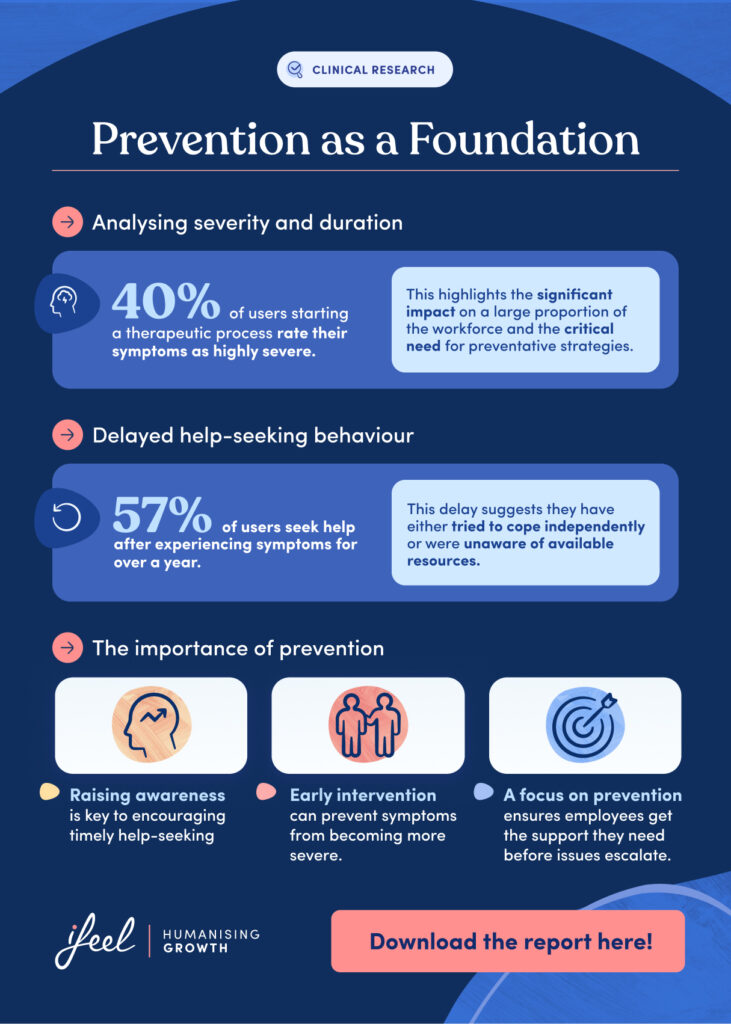Mental health sick leave is a right employees have when their mental health suffers due to conditions such as depression, anxiety, or burnout. This form of leave allows individuals to pause their work activities temporarily to receive necessary treatment and recover. However, understanding and implementing mental health sick leave policies is crucial for employee well-being and has significant implications for productivity, morale, and long-term organisational success.
For large international companies, prioritising mental health is essential. This article explores the importance of mental health sick leave, how it impacts the workplace, and the role of companies in supporting employees through proactive mental health initiatives.
The impact of depression and mental health disorders in the workplace
Mental health issues, particularly depression, have far-reaching consequences for both employees and companies. Depression is a complex condition that can manifest with varying levels of severity, including intense sadness, hopelessness, apathy, and an emotional disconnection from one’s surroundings. Severe depression can significantly limit an individual’s ability to function both personally and professionally.
According to the World Health Organisation (WHO), depression affects an estimated 5% of adults globally and is a leading cause of disability. It can lead to reduced productivity, increased absenteeism, and even long-term disengagement from work. For businesses, this translates into financial costs and productivity losses, not to mention the human toll of untreated mental health issues.
Given these findings, companies are clearly responsible for preventing and addressing mental health risks in the workplace.

Role of companies in mental health prevention
Many causes of depression and mental health issues are work-related, such as high stress, burnout, and interpersonal conflicts. This places a significant responsibility on organisations to mitigate risk factors. Companies, especially those with international teams, should adopt a preventative approach to mental health.
Actionable steps for HR leaders and decision-makers
- Implement corporate wellness programs: These should include access to mental health resources, workshops, and one-to-one services, such as ifeel.
- Encourage open dialogue: Foster a culture where mental health conversations are normalised and employees feel comfortable seeking support.
- Offer llexible work arrangements: Remote work options, flexible hours, and gradual return-to-work programs can greatly reduce stress and support work-life balance.
“Our partnership with ifeel has catalysed a positive shift in discussing mental well-being at SCOR. Since implementing ifeel’s solution, we’ve seen an increase in open conversations about mental health within our organization. ”
– Sabrina Kruse, Head of HR EMEA & Group Head of Diversity, Inclusion and Engagement at SCOR, an ifeel partner company.
Would your organisation benefit from a structured mental well-being program that proactively addresses employee mental health? Implementing these steps can significantly reduce the need for mental health sick leave.

Why mental health sick leave matters
Providing mental health sick leave is essential for allowing employees to recover and ultimately return to work more productive and engaged. Here are several reasons why mental health sick leave is a crucial part of a healthy workplace environment:
| Benefit | Description |
|---|---|
| Promotes recovery | Time away from work enables individuals to focus on recovery and self-care, which reduces stress and improves mental well-being. |
| Prevents burnout | Regular breaks, especially for those struggling with mental health, help prevent burnout and promote resilience, benefiting long-term productivity. |
| Enhances workplace culture | Normalising mental health leave fosters a supportive culture where employees feel valued and cared for, enhancing morale. |
| Reduces stigma | Supporting mental health leave encourages open conversations, gradually reducing the stigma around mental health in the workplace. |
| Improves retention | Employees who feel supported in their mental health are more likely to stay loyal to their employer, improving retention rates. |
How to communicate mental health sick leave
Open, honest communication is key when employees discuss mental health sick leave with their employer. HR managers should be prepared to support employees through this process with compassion and discretion.
1. Schedule a private meeting: Employees should feel comfortable discussing their needs with HR or a direct supervisor in a confidential setting.
2. Explain the situation briefly: Employees may wish to explain their need for leave, emphasising that they are committed to their recovery and their role within the organisation.
3. Request adjustments as needed: Employees may request flexible hours or a reduced workload upon returning from leave. These accommodations are essential for a smooth transition back to work.
HR managers, how could improved communication around mental health help employees feel more comfortable requesting support?
Leadership Lens ![🔎]()
For leaders, understanding the value of mental health sick leave goes beyond compliance; it’s about fostering a resilient, supportive workplace culture that empowers employees to seek help when they need it. Managers set the tone for how mental health is viewed within the organisation. By openly encouraging the use of mental health resources and normalising conversations around well-being, leaders can help reduce stigma, making it easier for employees to prioritise their mental health without fear of repercussions.
Proactive leadership involves not only supporting employees during their mental health recovery but also implementing preventive measures, like flexible work options and workload management, to mitigate stressors that can lead to burnout. Managers who recognise and address mental health proactively are not just reducing absenteeism; they’re building a workplace culture where employees feel valued, respected, and motivated, ultimately strengthening the entire team’s productivity and cohesion.
Clinical research: ifeel’s mental well-being trends report
Explore the latest trends in workplace mental well-being with ifeel’s Mental Well-being Trends Report. This comprehensive report reveals that prevention is the cornerstone of effective mental health strategies in the workplace. With stress, anxiety, and burnout on the rise, fostering a supportive environment can increase productivity in the workplace and reduce mental health sick leaves. However, 57% of employees seek help only after suffering for over a year, highlighting the critical need for early intervention.
Ready to make mental well-being a priority in your company? Download the full report now and discover actionable insights that can transform your team’s productivity and overall happiness.

Mental well-being solutions for enterprises
Organisations are not alone when facing this responsibility. Ifeel has created a mental well-being solution for companies designed by its team of leading psychologists to help companies boost their employees’ mental health, placing it at the core of their strategy to improve productivity sustainably.
Thanks to this partnership, HR managers can receive personalised, data-driven advice on the most effective measures to prevent a mental health sick leave among employees or address it best for all involved once it has already happened.
In addition, ifeel’s mental well-being solution for companies offers employees a mental health care service structured at different levels depending on individual needs. This way, employees can access various mental health care tools with ifeel’s app. On level two, they can receive emotional support through a chat with one of our platform’s licensed psychologists. If additional support is needed, they can access the third level of the program: online psychological therapy with a psychologist specialised in cases such as theirs.
We hope you have found this post about mental health sick leave useful. If you want more information about our mental well-being solution for companies, simply request it and we will contact your team as soon as possible.
